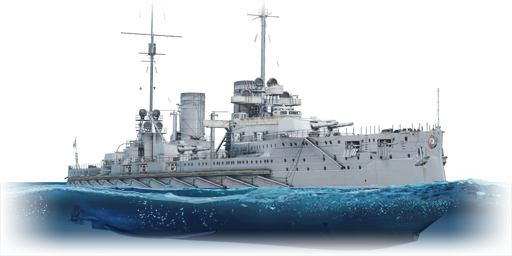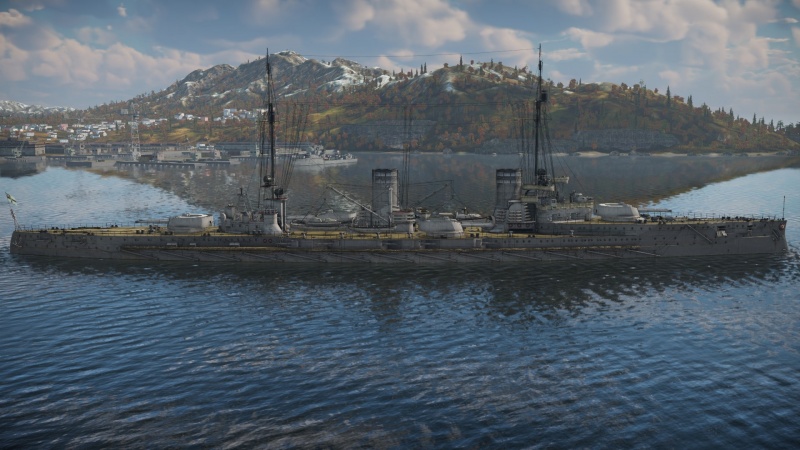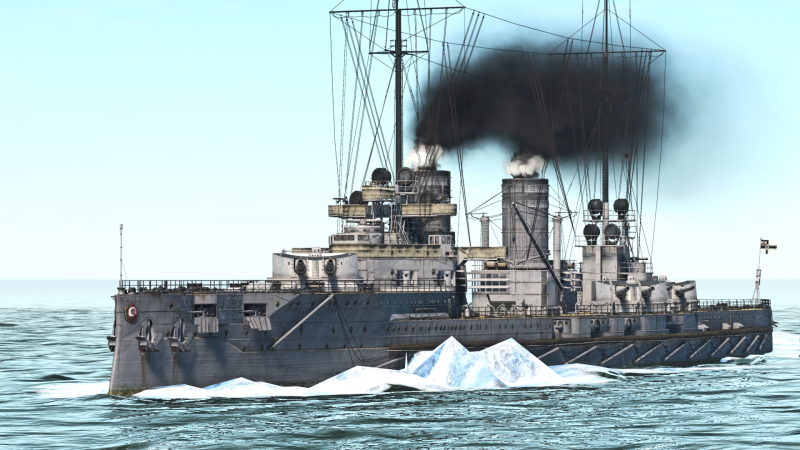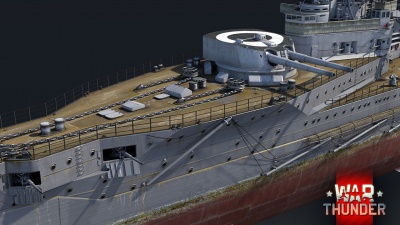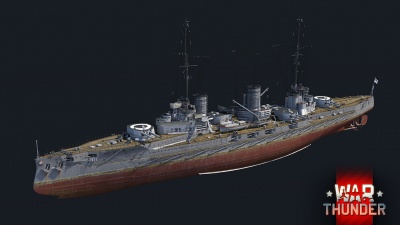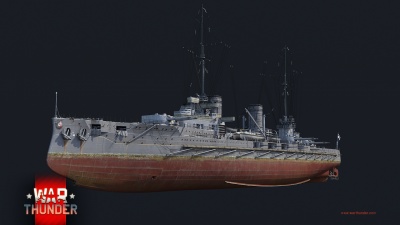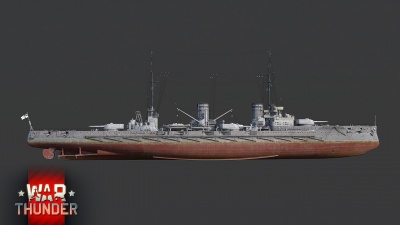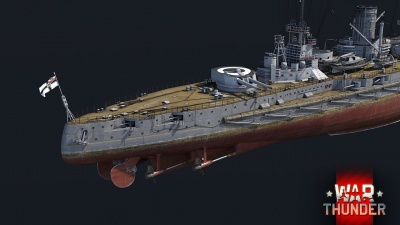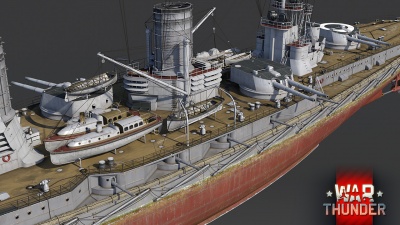SMS Von der Tann
Contents
Description
After the commissioning of the British Invincible-class and creation of the battlecruiser as a type of warship, the Kaiserliche Marine desired battlecruisers of their own and the Construction Office began work on a unique warship that was to be the first German battlecruiser. Although Admiral Tirpitz wished to create a German version of the Invincible class, with heavy guns and light armour, he was overruled and the Von der Tann was designed with guns 22mm smaller than the British ships, but with considerably greater protection and speed, setting the trend that subsequent German battlecruisers would follow: they would have greater protection at the expense of lesser firepower. Due to being a pioneering design, the resulting SMS Von der Tann features several new quirks unique to any German capital ship at that time. She is the first large German warship to be powered by steam turbine, which granted her very high top speed for a capital ship of that time. In addition, she also has a peculiar staggered wing turret arrangement that allows all of her guns to be fired full broadsides and therefore saves weight, a feature that would later be featured on the Kaiser-class battleship before being superseded by superfiring turrets.
After spending her time bombarding the British coast during the early half of the Great War, Von der Tann would participate in the Battle of Jutland between 31 May and 1 June 1916, during which she managed to sink the British battlecruiser HMS Indefatigable during the opening stage of the battle, although she suffered damage and malfunctions that rendered all of her main guns inoperable. Like most of the German high-sea fleet ships, Von der Tann met her end at Scapa Flow after she was scuttled to prevent the fleet from being divided between the Allied powers.
Introduced in Update "Hot Tracks", the SMS Von der Tann is the first battlecruiser on the German battlecruiser line and serves as an introduction to the German battlecruiser design; being significantly faster than its peers with serviceable armour, albeit at a cost of relatively smaller main guns. Due to her staggered wing turret placements, she is capable of firing full broadside with the same firepower as her battleship counterpart SMS Westfalen. When combined with her speed and heavy secondary armaments, this allowed her to perform very well at closer range except against heavier battleships. Due to these qualities, Von der Tann excelled at harassing enemy cruisers, where she is capable of outranging them while being highly resilient to their returning fire.
General info
Survivability and armour
The SMS Von der Tann is a battlecruiser. This class of ships is supposed to have the firepower of dreadnoughts, whilst having a superior speed to catch on their prey. This comes at the cost of armour thickness and coverage. She doesn't have coal bunkers protecting all turrets, the front, and rear turrets only have armour plates to protect their ammunition. A lucky shot will knock a turret out and its ammo storage underneath, especially from other dreadnoughts. Still, the Von der Tann's armour is still very thick and can shield off most of the cruiser's shells and is impervious to destroyers.
While the lack of AA guns can be problematic against enemy aircraft, this can actually help the Von der Tann to preserve more of her crew in a trading firefight against enemy cruisers, as enemy ships need to damage the crew compartment or casemate turrets to kill her crew.
Mobility
Being a battlecruiser, the Von der Tann features superior mobility compared to battleships of the time, though the ship is only a first generation battlecruiser and thus is still slower than the majority of cruisers in the game.
| Mobility Characteristics | |||
|---|---|---|---|
| Game Mode | Upgrade Status | Maximum Speed (km/h) | |
| Forward | Reverse | ||
| AB | |||
| Upgraded | |||
| RB/SB | |||
| Upgraded | |||
Modifications and economy
Armament
Primary armament
The Von der Tann features eight 283 mm SK L/45 cannons arranged in four twin turrets. While the ship's left and right turrets appear to be obstructed by lifeboats in your hangar screen, they will be removed once you get into battle, allowing the turrets to traverse into the other sides, and thus making her capable of doing full broadsides with a decent firing angle. The guns also have a good minimum reload time for its calibre at 20 seconds with an ace crew.
While they are not as powerful as the 305 mm cannons equipping other dreadnoughts, the 283 mm guns still pack a decent punch and can make quick work of destroyers and cruisers. However, these pre-WW1 era guns are a little lacking when it comes to penetration capabilities against more comparable or superior opponents.
At 5km, the AP shell has a maximum of 324 mm of penetration, barely enough to penetrate the main belt on a number of battleships, and that's assuming the target is not angled to any degree (which they usually are) and that the shell is hitting at a flat trajectory (which is physically impossible at that range unless the target is listing to the side). At 10km, this drops to 212 mm of penetration, at which range the shell is rendered incapable of punching through un-angled main armour belts of even some battlecruisers, let alone the heavy belts of battleships. Whilst this does not mean that the guns cannot damage such targets, it's not as though the entire ship has such protection after all, it does still severely limit the guns usage against any but the most weakly protected capital ships, and captains of the Von der Tann will have to get in to extremely close ranges to be able to punch through the thick armour present at higher tiers.
| Penetration statistics | |||||||
|---|---|---|---|---|---|---|---|
| Ammunition | Type of warhead |
Penetration @ 0° Angle of Attack (mm) | |||||
| 1,000 m | 2,500 m | 5,000 m | 7,500 m | 10,000 m | 15,000 m | ||
| Sprgr. L/3.6 Bdz | SAP | 359 | 312 | 248 | 199 | 162 | 120 |
| Psgr. L/3.2 | APC | 469 | 408 | 324 | 260 | 212 | 157 |
| Shell details | ||||||||||||
|---|---|---|---|---|---|---|---|---|---|---|---|---|
| Ammunition | Type of warhead |
Velocity (m/s) |
Projectile mass (kg) |
Fuse delay (s) |
Fuse sensitivity (mm) |
Explosive mass (TNT equivalent) (kg) |
Ricochet | |||||
| 0% | 50% | 100% | ||||||||||
| Sprgr. L/3.6 Bdz | SAP | 855 | 302 | 0.025 | 15 | 17 | 47° | 60° | 65° | |||
| Psgr. L/3.2 | APC | 855 | 302 | 0.025 | 15 | 8.95 | 48° | 63° | 71° | |||
Secondary armament
The Von der Tann features 10 х 150 mm SK L/45 cannons, five mounted in a casemate on each side of the ship. There are also 16 х 88 mm SK L/45 cannons, placed in a set of four casemates on the bow, stern, and command tower, as well as four turrets on the rear fire control tower.
The 150 mm guns are very reliable against enemy cruisers at mid-to-close range (within 7 km), being able to chew up most of their crew quickly due to the short reload time of 5 seconds, though ineffective beyond 7 km due to its awful dispersion. Other than the HEF shell, the guns have an option to load a SAP shell and an APCBC shell, the SAP is largely useless due to poor penetration, while the APCBC shell can tear up the modules of lightly-armoured enemy at closer range.
The 88 mm guns mainly act as complementary weapons and can only be loaded with HEF shell. The guns don't pack as much punch as the 150 mm, but are still quite useful against destroyers and PT boats.
| Penetration statistics | |||||||
|---|---|---|---|---|---|---|---|
| Ammunition | Type of warhead |
Penetration @ 0° Angle of Attack (mm) | |||||
| 1,000 m | 2,500 m | 5,000 m | 7,500 m | 10,000 m | 15,000 m | ||
| Sprgr. L/4.1 Kz | HE | 21 | 21 | 21 | 21 | 21 | 21 |
| Sprgr. L/4.1 Bdz | SAPBC | 95 | 80 | 61 | 47 | 37 | 28 |
| Psgr. L/3.7 | APCBC | 238 | 201 | 153 | 117 | 93 | 71 |
| Shell details | ||||||||||||
|---|---|---|---|---|---|---|---|---|---|---|---|---|
| Ammunition | Type of warhead |
Velocity (m/s) |
Projectile mass (kg) |
Fuse delay (s) |
Fuse sensitivity (mm) |
Explosive mass (TNT equivalent) (g) |
Ricochet | |||||
| 0% | 50% | 100% | ||||||||||
| Sprgr. L/4.1 Kz | HE | 835 | 45.3 | 0 | 0.1 | 1,600 | 79° | 80° | 81° | |||
| Sprgr. L/4.1 Bdz | SAPBC | 835 | 45.3 | 0.01 | 7 | 1,050 | 48° | 63° | 71° | |||
| Psgr. L/3.7 | APCBC | 835 | 45.3 | 0.015 | 7 | 990 | 48° | 63° | 71° | |||
Anti-aircraft armament
Built during the infancy of naval aviation, the Von der Tann is barely equipped to deal against aerial threats. Therefore, her "anti-air" armament only consists of two antique 7.92 mm machine guns, which won't help to deter any aerial threats. Essentially, it is making her a sitting duck against enemy air support.
Additional armament
Similar to other dreadnoughts in her era, the Von der Tann features four underwater torpedo launchers, two mounted directly at her bow and stern respectively, and two others placed on each side of the bow. Due to this peculiar placement, the torpedo is highly situational and will not help much to destroy an enemy ship. The torpedo itself is also pretty weak and slow, with only 122 kg of TNT and a top speed of only 50 km/h. Thus, you should rely on her main and secondary armament instead.
Usage in battles
As a battlecruiser, the Von der Tann is (relatively) fast and well-armed. The eight 283 mm guns can deal a capable amount of damage and have a reload of 20 seconds, much shorter than most other battlecruisers and battleships (and the same as some American heavy cruisers), as well as being capable of doing full broadsides. While other battleships can punch through your armour, cruisers will seriously struggle. Target cruisers and punish them with your secondary guns and main battery. They'll struggle with your armour, and they'll struggle to outrun you.
Your main threat will be battleships, who can angle against your guns and punch through your armour comfortably. Use your mobility to get away from, or around, them, and don't be afraid to unleash some torpedoes on them if they do get too close.
Pros and cons
Pros:
- Good speed for a ship of its age, able to outrun most battleships and stay close to cruisers
- Out-guns and out-armours every cruiser in the game
- Can do a full broadsides with the same damage potential as the SMS Westfalen
- Good reload on its main guns, better than the Admiral Graf Spee despite them being the same size
- Deadly secondary armament that can punish cruisers if they come too close
Cons:
- Still slower than the majority of cruisers, can easily get left behind
- Main armament lacks penetration required to compete with most other capital ships
- Secondary armament is woefully inaccurate beyond 7 km
- Placement of flank turrets makes it prone to ammo detonation from torpedo hits
- Effectively no AA protection, easy target for aircraft
History
Devblog
With the appearance of HMS Invincible in 1906, the Imperial Navy found itself lacking an appropriate response as the British battlecruiser outmatched any comparable vessel in the German fleet at the time. As a result, German ship builders began working on designing an equivalent vessel in the same year under the name "Cruiser F". As the ship would eventually become Germany's first battlecruiser, its design was carefully considered, with emphasis being put on speed and protection.
By mid 1907, Cruiser F's design had been finalized and its construction approved by the Kaiser in June, christening the vessel SMS Von der Tann in honor of a Bavarian general. Von der Tann was laid down in March 1908 and launched exactly a year later, before being completed and commissioned into service in September 1910. At the time of commissioning Von der Tann quickly became the new symbol of German naval power, being not only the first German warship fitted with steam turbine engines, but also the world's fastest warship of its type at the time. After completing trials, Von der Tann was sent on a cruise to South America before returning to Germany in May 1911.
During WWI, Von der Tann participated in numerous naval operations in the war: including the Battle of Jutland in 1916, as well as participating in raids against British ports and engagements against the Russian Navy in the Baltic Sea. At the end of WWI in 1918, Von der Tann along with the remainder of the German Navy was interned at Scapa Flow. In the following year, the interned German fleet along with Von der Tann scuttled itself to prevent capture by the Allies with this event marking the end of the warship's illustrious career.
Media
- Skins
- Images
- SMS Von der Tann Devblog Images
See also
- Vessels of a similar role, configuration or era
External links
| Blohm & Voss | |
|---|---|
| Destroyers | |
| Type 1934A | Z15 Erich Steinbrinck |
| Heavy Cruisers | |
| Admiral Hipper-class | Admiral Hipper |
| Battlecruisers | |
| Unique Ships | SMS Von der Tann · SMS Derfflinger |
| See Also | Blohm & Voss Aircraft Division |
| Germany battlecruisers | |
|---|---|
| SMS Von der Tann* | |
| SMS Derfflinger* | |
| Scharnhorst-class | Scharnhorst |
| * Unique ship | |


